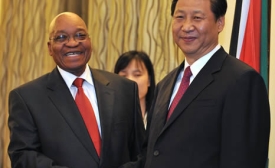kenya
Tanzania expects tourist numbers to double to 2 million by 2017, the state tourist board said, challenging regional rival Kenya where Islamist attacks have scared away visitors. Tanzania, famed for its pristine beaches and safari parks beneath snow-capped Mount Kilimanjaro, has always played second-fiddle to Kenya, which has a more developed tourism industry and better air links to the key markets in Europe and United States.
President Barack Obama said the U.S. is expanding an initiative to develop and train political and economic leaders in Africa. Obama is expanding a U.S.-based program for young African leaders, and the U.S. Agency for International Development is providing $38 million to create leadership centers in Ghana, Kenya, South Africa and Senegal.
China’s increasing involvement in Africa has captured considerable attention from policymakers and academics. Formalized in a 2006 policy statement, “China’s Africa Policy,” Beijing’s interest in the region translates into Chinese government and government-affiliated institutions investing billions of dollars in large-scale construction projects across the continent.

A review of Howard French's book: China’s Second Continent: How a Million Migrants Are Building a New Empire in Africa.
Two bombs killed 10 people and wounded 70 others Friday, at a market in Kenya’s capital, while hundreds of British tourists were evacuated from the coastal resort of Mombasa after warnings of an impending attack by Islamic extremists. President Uhuru Kenyatta, appearing at a previously planned news conference soon after the bombings, offered his condolences. But he dismissed the tourism warnings from the U.S. and Britain that led to the evacuations, saying terrorism is a common problem and not unique to Kenya.

Tourism and nation branding have the potential to boost a country's soft power and convey values and culture. However, it's not always a win-win situation for governments (or tourists).
Tourism is a money-spinner in Kenya - it is the country's second largest source of income, writes Jamal Osman. Its safaris are world famous, but a recent drop-off in wildlife tourism has given rise to this new type of sightseeing.
After the World Trade Center attacks in 2001, al-Qaeda became one of the great modern bogeymen, claiming credit for terrorist attacks all over the world. However, the jihadist group is less a centralised organisation than a loose coalition of franchises, writes Annabelle Quince.







